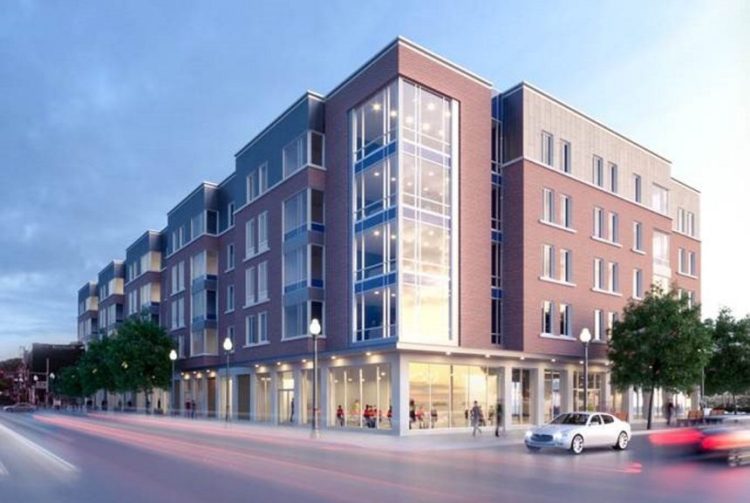WATERVILLE — Construction of a $25 million Colby College student residential complex on Main Street moved a step closer to reality Tuesday when the City Council took a final vote to sell property on The Concourse for $300,000 to Colby for the building.
In related matters, councilors took the first of two needed votes to approve a tax increment financing district and related development plan for the five-story complex. They also voted to amend the existing downtown TIF district to remove the site from the current district in order to create a new one for the 100,000-square-foot complex.
Councilors in two weeks will take a final vote on the TIF for the complex, to be built on the northeast corner of The Concourse at 150 Main St. The amendment to the current TIF district is subject to state approval.
Officials hope to start construction soon on the complex, which is scheduled to open in the fall of 2018 and house 200 Colby students on the upper floors, as well as faculty and staff members, in apartments with common living areas. They will be part of a special civic engagement program that will include involvement in the community. The first floor will house retail uses and a special, glassed-in forum room that may be used by city officials, nonprofit organizations, Colby and other entities who want to hold meetings there.
While the upper floors of the building will be tax-exempt, the first floor will be taxable. The city’s method for assessing the tax value of the first-floor retail yields about $36,000 in taxes. However, as part of the TIF agreement, Colby plans to pay extra money in lieu of paying taxes, totaling $65,000 a year.
Construction of the building is one of several investments Colby is making downtown to the tune of more than $45 million. Renovation of the Hains building across the street and construction of a 42-room boutique hotel with a restaurant on the southern end of Main Street are part of the college’s efforts to help revitalize downtown.
Mayor Nick Isgro said that with Colby’s investment, as well as that of others, including downtown businessman Bill Mitchell and the DePre family, all of whom have also purchased buildings downtown as part of revitalization efforts, the investments will be upward of $60 million.
“The economic development impact for this almost couldn’t be quantified,” Isgro said.
He cited the Harold Alfond Foundation’s announcement earlier in the day that it would fund $5.5 million to start Alfond Leaders, a program to help reduce college students’ debt if they work at Maine-based businesses in science, mathematics, engineering and technology. Isgro said downtown revitalization, to include the creation of jobs, is possible through a partnership among civic leaders, nonprofit organizations and municipal government. He said there is a lot of positive energy in Waterville now and he is thankful for Colby College President David Greene and his team.
Greene updated a packed council chamber on revitalization efforts and noted that the student residential complex is not a profit-making building. Colby will lose about $2 million a year on the building, he said.
“This is an investment in Waterville. It’s not a money-maker for Colby, just to be clear on this,” he said.
Colby, he said, enrolls more than 200 students from Maine each year, who make up 12 percent of Colby’s student population. Colby gives $6.5 million every year in financial aid to those Maine students, who include Waterville residents, he said.
“It’s an extraordinary commitment on the part of the college — one that preceded me,” he said.
Still, Councilor Nick Champagne voted against selling the property to Colby. He also voted against the proposed TIF for the residential complex. Champagne thanked Greene, Mitchell and others who were sitting in the front row Tuesday and said Colby’s investment downtown is the biggest he has ever seen. He said the future for Main Street looks bright, but the $65,000 cannot be used for schools or plowing or other needs and is “handcuffed” and earmarked for downtown. He said Waterville is in a budget crisis and he cannot stand idle while his neighbors struggle financially.
“I fully support efforts to improve our downtown. I just feel a better deal can be made,” Champagne said.
Isgro said that budget crisis evolved over a 20-year period, Colby’s expected revenue loss will be $2 million a year on the residential complex, and he thinks the city should be committed to the partnership with Colby.
“To me, I continue to reaffirm to the council that it’s either this or it’s probably nothing,” Isgro said.
Councilors Lauren Lessing, D-Ward 3, and Winifred Tate, D-Ward 6, abstained from voting on the land sale and TIF, as they are Colby employees. Champagne voted against the property sale and TIF. Council Chairman Steve Soule, D-Ward 1, and councilors Sydney Mayhew, R-Ward 4, and Jackie Dupont, D-Ward 7, voted in favor of both.
Mayhew, a member of the city’s TIF Committee, which unanimously supported the TIF, said whether one is a critic or an advocate for the sale of the property and TIF, one must look at the broader picture.
“This is an economic bounty that we all should be partaking in,” he said.
Mayhew, who campaigned for his seat on the council citing the need for property tax relief, said the Colby investment and related efforts represent that road to property tax relief.
“It’s a blessing from heaven, folks, and this is sitting right before our eyes and we have to take advantage of it,” Mayhew said.
The council voted 6-1 to amend the downtown TIF district. Champagne, a new councilor and former member of the Planning Board, was the lone dissenter.
Amy Calder — 861-9247
Twitter: @AmyCalder17
Send questions/comments to the editors.




Comments are no longer available on this story